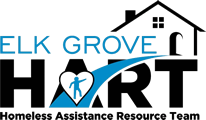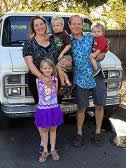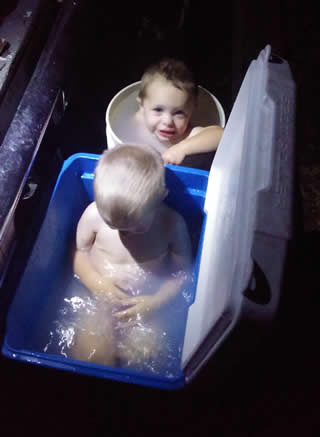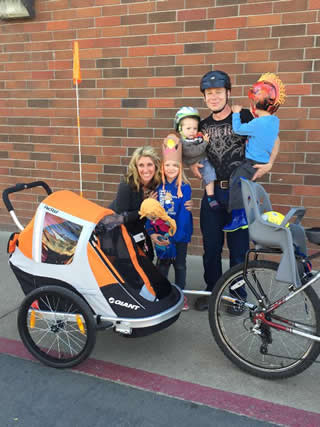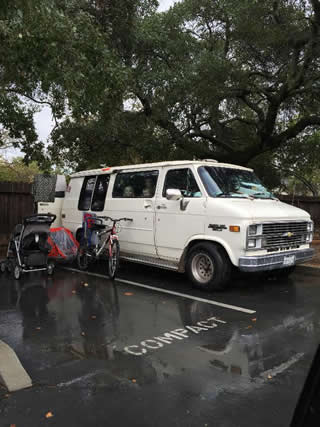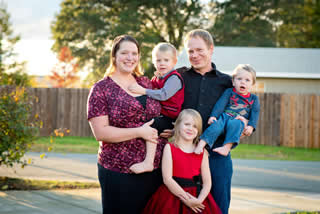By Tracy Rivera
@RiveraTracyM
|
Not many people can say they’ve been touched by an angel; Amy* believes her family has been touched by several. The young family of five are moving from Meadows House, a live-in program for homeless families, to an apartment after spending the last year homeless. It won’t take long, all their possessions fit neatly in 10 boxes.
How does a family become homeless? “Gradually,” Amy assured me. We settled into the communal office, a slight hum in the air from the computer running in the corner. They’ve shared this house with three other families over the last six months. “It’s been one interesting adventure.” She tucked a leg under her flowing skirt and sank into the couch. Pink cheeks and damp hair speak of a recent shower.
The family does not take running, heated water for granted. “It used to take three gallons of water to shower behind the van in the parking lot.” Amy had to boil water on a camp stove to wash the children.
“Our first night in Meadows House we took turns in the shower. We spent over an hour and a half and never ran out of hot water.”
Amy and Paul married eight years ago, a young couple full of hope and promise. They were making it through the recession, “barely squeezing by,” when her dad offered to let them move back home. It seemed like a good idea. They’d be able to combine resources and save a little money.
The situation deteriorated until Amy and Paul began to fear for the safety of their children. “Even now it makes me nauseous thinking about it. The [domestic violence] was more than I could deal with. So we left.”
Amy, Paul, and their three children aged six, three, and nineteen-months, moved into a hotel. She shrugged, “I stupidly assumed we’d be living in a motel for a week or two or three until we found an apartment. It didn’t happen.”
With no recent rental history, limited inventory and exorbitant Sacramento County prices, the family could not find housing. “We realized if we kept staying there the money [Paul] was making would go straight to the hotel.”
|
The Smiths moved into their 2013 Sienna Minivan in June of 2015.
The kids had fun “camping” and spent time outside in the mild spring. However, the Sacramento region goes from mild to scorching overnight. “During those 100 degree days we went to indoor play structures.”
Amy remembers many nights the children couldn’t sleep until ten or eleven because of the heat. The family sat in the stifling van with the kids crying, “Momma, it’s hot,” as beads of sweat collected on their temples.
Again, Amy assumed it would only be for a short while. Paul made good money working construction. Amy stayed with the children in the van and searched for housing. Several promising rentals fell through at the last minute. “You keep going. Putting one foot in front of the other. There were definitely days that I wanted to just sit down and cry, and I’m sure there were days that I did. But we did it for the children.” Amy paused. “Those babies are worth everything. Everything. They are my everything.”
Amy recalls one night they parked off Grant Line road. “Five miles from anywhere.” Around 2am bright lights flooded the van as the sound of gravel crunched under heavy tires. They woke up to a tow truck parked next to them.
A man tapped on the window and Amy’s stomach clenched. “I can see you’re sleeping with your kids in the car. It’s gotta be hard. But your van’s up for repossession.” Amy leaned forward. She explained how the driver jeopardized his own job to help them. “Get in your van and drive away. Take a left at the stop sign. I’m going to take a right. Don’t park back here again.”
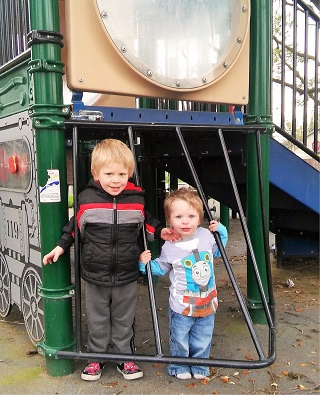 “We drove, and we cried. And felt so thankful because he could have taken our van five miles from nothing on Grant Line road. We could have been standing there with our babies and our stuff in a pile. He was an angel.”
“We drove, and we cried. And felt so thankful because he could have taken our van five miles from nothing on Grant Line road. We could have been standing there with our babies and our stuff in a pile. He was an angel.”
After a couple months living in the Sienna it became more difficult to make the payments. They bought a 1988 Chevy Cargo van. “We set it up almost like a crappy motorhome.” Amy laughed. “It worked.” They slept in the Cargo van and used the Sienna for transportation.
Amy remembers meeting another angel who orchestrated a turning point. She dropped Paul off at work and took the children to a park. “It was one of the worst days I was having, sitting in the front seat, crying my eyes out. The kids bouncing around the back and this lady walks up.” She laughed as she remembers thinking, There’s a whole parking lot, why are you parking next to me? She tried to cool her puffy eyes as the lady approached.
“I’ve seen you here a couple times and I’m pretty sure you’re homeless. Do you guys need any food?”
The plain-spoken assessment took Amy off guard. “We are. But we have our ice chest full of goodies. We have everything we need.”
The lady pulled out a phone and called Debbie Schoeneshoefer, the president of Homeless Assistance Resource Team (HART). She handed the phone to Amy, who, still slightly dazed, confessed they were living in a van.
The hope of resources lifted her despair. “It made that one day, that bad day turn around. I wish I knew who she was so I could thank her.”
When I spoke to Debbie she explained the kind of bravery it took for Amy to admit living in a vehicle. “A lot of people are ashamed of their situation and fearful their children might be taken away.”
Debbie remembers meeting the family at the food bank. They were ideal candidates for the HART program. “Our mission is to break the cycle of poverty through counseling, financial planning, and mentorship.” HART volunteers arranged for the family to park behind the United Methodist Church. “People don’t think about it, but you get the Police banging on the car window in the middle of the night, it’s scary.”
The church parking lot provided safety for the children and a bit of normalcy through routine. Amy felt grateful. “It was comforting to have the home base to come back to every night.” Unfortunately, a complaint from a neighbor triggered a police report, which alerted the towing company. Amy lifted both brows and one shoulder. She chuckled, “We hoped we were smarter than [the towing company]. Obviously not.”
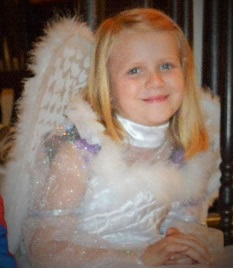 It happened in the middle of the night. Amy and Paul woke the next morning with the Sienna gone. Paul said, “Did you move the van?” Then looking around the small lot. “Did I move the van?”
It happened in the middle of the night. Amy and Paul woke the next morning with the Sienna gone. Paul said, “Did you move the van?” Then looking around the small lot. “Did I move the van?”
That moment still makes her laugh. “He’s a hoot.”
It took a few minutes to register that the Sienna had been towed. “It had all the kids’ car seats and most of our stuff. It was sad, but we knew it was coming. We had to pay an insane amount to get everything back.”
That wasn’t the end of their bad day.
The Chevy blew a head gasket on the return trip. “It was a miserably hot day, we had almost no food with us, no phones and our oldest was waiting to be picked up from school.”
Amy said it was Paul’s worst day. “He jogged over a mile before he found someone with a phone. In the space of 24 hours we lost both vehicles.”
A friend called AAA and had the Smith’s cargo van towed back to the church parking lot. They spent the months before moving into the Meadow’s House without transportation.
The family experienced another setback when Paul lost his job. Thankfully, two days later Amy was hired through a temp agency to substitute at a school in Davis. “That affected the kids more than being homeless. Not having mommy there.” She went from being a stay-at-home parent to gone for up to 12 hours a day.
|
Paul biked their six-year-old daughter over a mile to school every day. The baby in a bike trailer and the toddler in a child seat. When asked about days that it rained, “We wore coats and got wet.” The staff at Florence Markofer Elementary School gifted the family a new bike trailer and funds to help get the family’s van running. More angels.
Debbie described the joint effort needed to meet stringent HUD regulations to get the Meadows House online. “The house was ready in August, but the family couldn’t move in until the end of November when all requirements were met.” Meanwhile, nighttime temperatures plunged into the 20’s creating a desperate situation for the family.
“You meet a family like this, who work hard, don’t have substance abuse issues, and could be anyone’s neighbor. It shatters common misconceptions of what homelessness looks like.”
When asked how it feels to see the Smith family ready to step into their future, Debbie said, “It’s a privilege. It’s the most important, rewarding privilege. There just aren’t words to express how happy that makes me.”
|
What Amy remembers most about their year without a home is not the weather extremes; not trying to figure out where the next meal would come from; how to afford diapers, take a shower, get to work. She remembers the safety net of people who stepped in and showed them kindness. “There is more good in the world than most people realize.”
The family became homeless in June of 2015. One year later they prepare to settle into their new apartment. When asked what’s next, Amy said it’s her dream to get a degree in Early Childhood Development and become a teacher. She wants to give back. Be an angel in someone else’s life. “Our goal has always been to be happy, to bring joy, to be excited - to be with the kids.”
Paul traveled extensively as a child, spending many years in third-world countries. Eventually he’d like to show his children the broader world around them.
When asked if there are words of advice or encouragement for others facing their situation, Amy said, “Find things that give you joy. Without joy, life is not worth it.”
There are people who jump into the trenches of humanity to improve the slice of life given others. They are angels, and they’re all around us.
|
***
For more information on HART, or to learn how you can be an angel, please visit www.elkgrovehart.org
*Names of family members have been changed.
